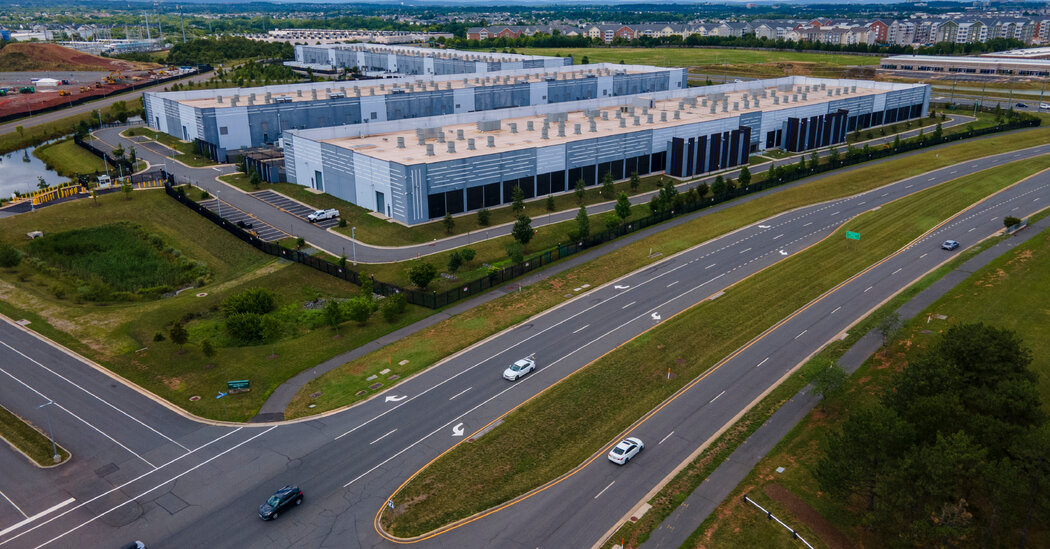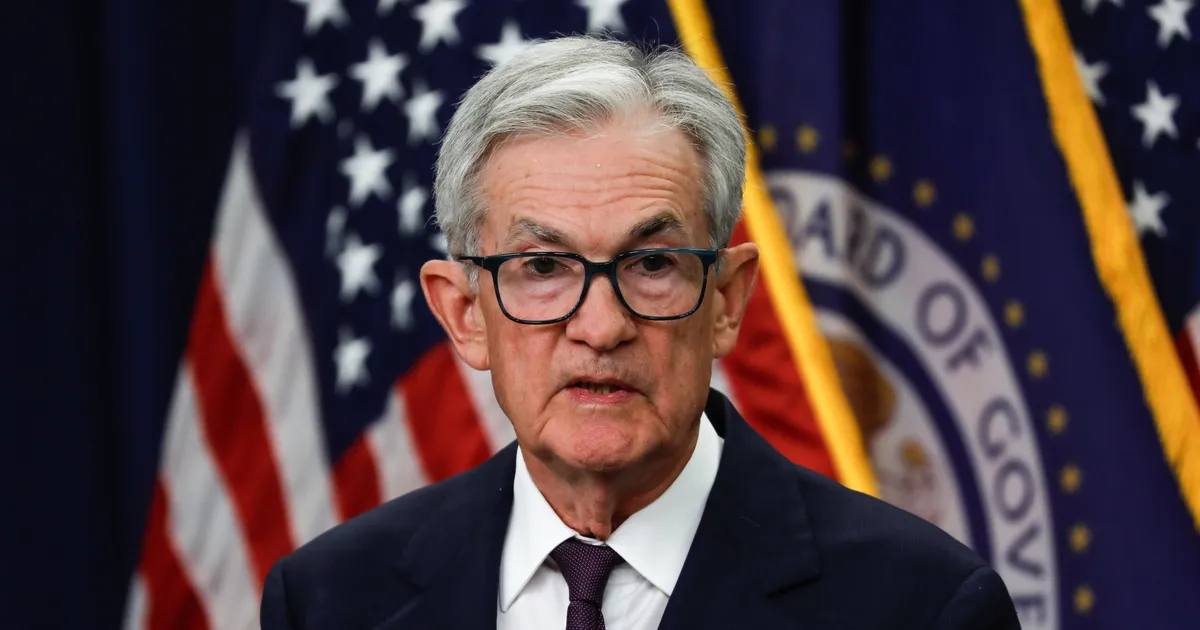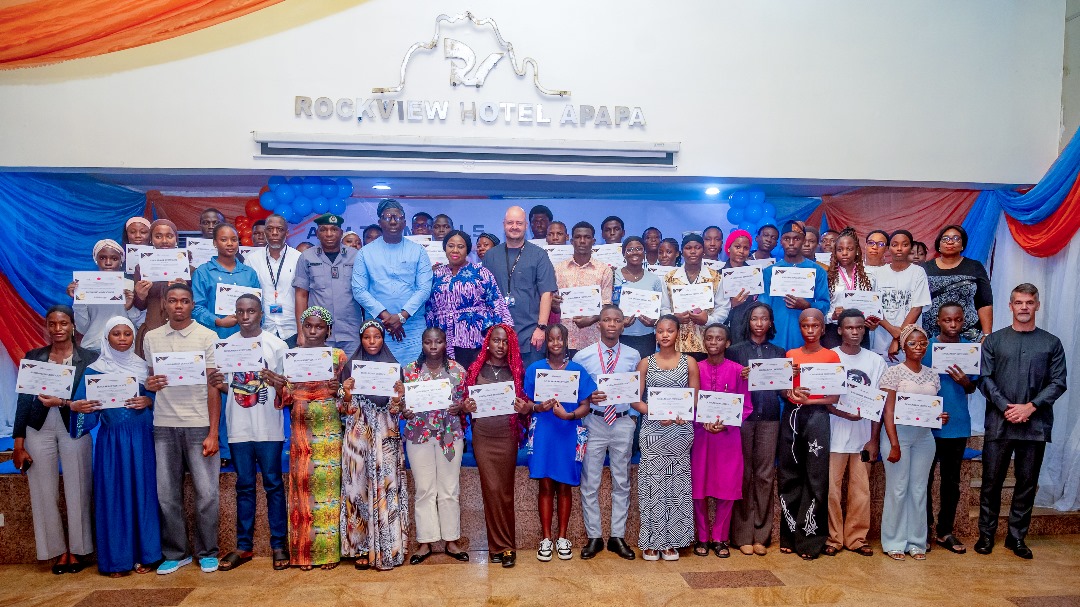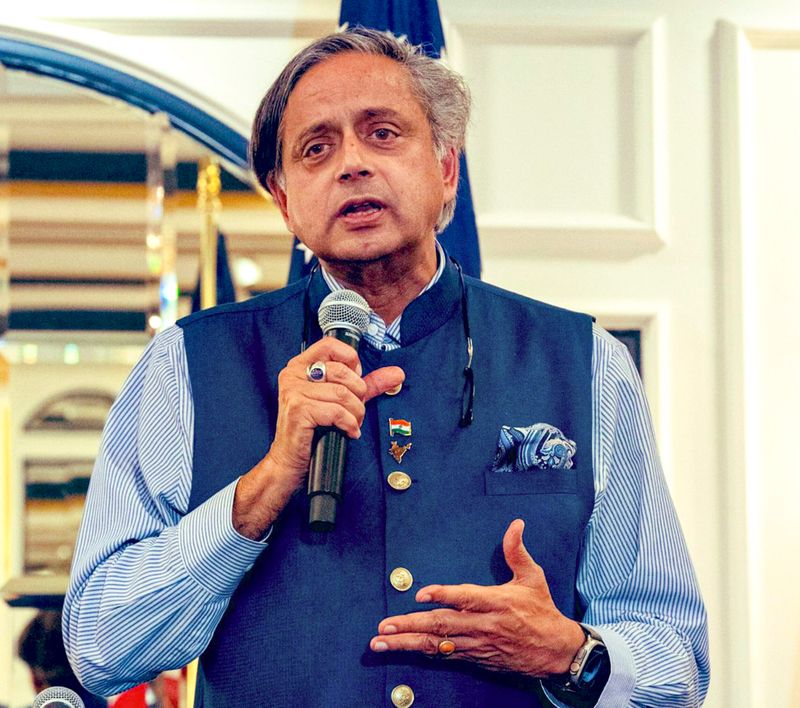Copyright The New York Times

Like many companies trying to keep up in the A.I. boom, QTS Data Centers, a digital infrastructure company that’s wholly owned by the investment giant Blackstone, has been dropping billions of dollars to expand its network of cutting-edge computing facilities. It has also, like a growing number of fellow tech companies, found a way to unlock additional (and much-needed) cash: exotic financial instruments. According to an investor offering sheet obtained by DealBook, Blackstone is on the cusp of closing a $3.46 billion commercial-mortgage-backed securities (C.M.B.S.) offering to refinance debt held by QTS, the biggest player in the artificial intelligence infrastructure market. It would be the largest deal of its type this year in a fast-accelerating market. (Blackstone declined to comment.) The bonds would be backed by 10 data centers in six markets (including Atlanta, Dallas and Norfolk, Va.) that together consume enough energy to power Burlington, Vt., for half a decade. Blackstone’s offering is part of the latest push in the A.I. infrastructure financing blitz. According to McKinsey, $7 trillion in data center investment will be required by 2030 to keep up with projected demand. Google, Meta, Microsoft and Amazon have together spent $112 billion on capital expenditures in the past three months alone. The sheer scale of spending is spooking investors: Meta’s stock tumbled 11 percent after the company revealed its aggressive capital expenditure plans last week, and tech stocks have sold off this week on overvaluation fears. Now, the tech giants are turning to financing maneuvers that may add to the risk. To obtain the capital they need, hyperscalers have leveraged a growing list of complex debt-financing options, including corporate debt, securitization markets, private financing and off-balance-sheet vehicles. That shift is fueling speculation that A.I. investments are turning into a game of musical chairs whose financial instruments are reminiscent of the 2008 financial crisis. Big tech companies are looking for new sources of financing. While Meta, Microsoft, Amazon and Google previously relied on their own cash flow to invest in data centers, more recently they’ve turned to loans. To diversify their debt, they’re repackaging much of it as asset-backed securities (A.B.S.). About $13.3 billion in A.B.S. backed by data centers has been issued across 27 transactions this year, a 55 percent increase over 2024. If investors want to buy data center A.B.S., they have two options, according to Sarah McDonald, a senior vice president in the capital solutions group at Goldman Sachs: They can invest in a data center that has one tenant, like a hyperscaler, or in a co-location data center, which has thousands of smaller tenants. The former is an investment-grade tenant with a long-term lease, but the risk is highly concentrated; the latter is most likely renting out to noninvestment-grade tenants with short-term leases, but the investment is extremely diversified. Digital infrastructure “is something that investors have a huge appetite for,” McDonald said. Despite the increase in popularity, data center securities are just a small slice of the A.B.S. market, which is dominated by credit card, auto, consumer and student loans. Blackstone’s $3.46 billion C.M.B.S. offering may seem like small potatoes compared with some other debt-fueled deals, such as Meta’s $30 billion corporate offering to finance its data center in Louisiana. But it’s unprecedented for the C.M.B.S. market, where issuance for data-center-backed deals was just $3 billion for all of 2024. “They realize how much cash they’re going to need, so they’re getting the C.M.B.S. market comfortable with this type of asset,” said Dan McNamara, the founder and chief investment officer of Polpo Capital, a hedge fund that focuses on C.M.B.S. He added that while most traders in the market were well versed in assets like office space or industrial buildings, with data centers, “it’s not traditional ‘bricks and sticks’ commercial real estate.” To complicate matters further, the share of single-asset-single-borrower securities (S.A.S.B.) — for example, the assets inside the bond being sold are all from the same company or a single data center — is rising, with 13 percent of all S.A.S.B. deals coming from data centers, according to Goldman Sachs. “It’s one company, and these assets are quite similar. If there’s a problem with A.I. data centers, like if their current chips are obsolete in five years, you could have big losses in these deals,” McNamara said. “That’s the knock on S.A.S.B.: When things go bad, they go really bad.” Also at play: a financial tool that came into vogue before the financial crisis. Called a special purpose vehicle (S.P.V.), it’s a legal entity that allows a company to take on a lot of debt without having to hold it on its own balance sheet. When Meta structured its $30 billion debt offering for its new data center in Louisiana — the largest private capital transaction on record — Morgan Stanley arranged the debt to sit in one of these custom, off-balance-sheet vehicles. Although the S.P.V. was created to service Meta, the debt technically belongs to the S.P.V., not Meta, which makes Meta look healthier on paper. The maneuver made it easier for Meta to raise another $30 billion in the more traditional corporate bond market. Overall, according to Morgan Stanley, $800 billion in private credit will be needed over the next two years to fund data centers. And S.P.V.s are becoming a more popular way to structure it. Following Meta’s lead, Elon Musk’s xAI is also tapping an S.P.V. to potentially hold $20 billion in debt to buy Nvidia chips and then rent them to xAI. Are murky financial instruments spreading the risk of the A.I. spending frenzy? According to Menlo Ventures, only 3 percent of consumers pay for A.I.-related services, amounting to about $12 billion per year. If hyperscalers are unable to generate enough profit to offset the costs related to capital expenditures, systemic risk could enter credit markets. In October, the Bank of England wrote that, as companies continue to shift from using their own cash flow to amassing debt for data centers, risk will continue to mount. “This is a fast-evolving topic, and the future is highly uncertain,” the bank wrote. IN CASE YOU MISSED IT The Trump administration began reducing flights at 40 major airports. Despite hundreds of canceled flights across the United States, airports were largely working normally on Friday. But Transportation Secretary Sean Duffy said flight cuts could reach as high as 20 percent at some airports by Thanksgiving if the government shutdown continued to leave air traffic controllers working without pay. Democrats won big on Election Day. Zohran Mamdani, a democratic socialist, won a decisive victory in the New York City mayoral election. Business leaders who had campaigned against him were not comforted by the appointment of Lina Khan, the former head of the Federal Trade Commission, to his transition team; Wall Street deal makers thought she was too aggressive at policing mergers. Gov. Gavin Newsom’s plan to redraw California’s congressional districts in Democrats’ favor won significant support. And Democrats won races for governor in New Jersey and Virginia. Tesla shareholders overwhelmingly approved Elon Musk’s pay package, which could eventually be worth about $1 trillion. For Musk to reach the first of 12 tranches of payouts, Tesla must achieve $2 trillion in market capitalization in addition to one of any ambitious milestones, including selling one million humanoid robots or putting one million robotaxis on the street. Supreme Court justices appeared skeptical of President Trump’s tariffs. D. John Sauer, the solicitor general, faced tough questions on Wednesday from a majority of justices about the legality of the White House’s use of emergency powers to impose tariffs. The case, which could be decided within weeks, is seen as a test of the limits of executive power. Other big deals: Trump and executives of Eli Lilly and Novo Nordisk announced a plan to expand access to obesity drugs. Kimberly-Clark agreed to buy Kenvue, the maker of Tylenol, for $40 billion. Cornell reached a $60 million deal with the Trump administration to restore hundreds of millions in federal funding to the university. And Representative Nancy Pelosi announced her retirement. The C.E.O. who wants to build a market for everything Just a year ago, it wasn’t clear that election betting was legal in the United States. Ahead of the New York City mayoral election this week, speculators on the prediction market Kalshi wagered more than $137 million on the outcome, and news outlets from Fox Business to Bloomberg cited the odds. For Kalshi, which successfully sued its regulator, the Commodity Futures Trading Commission, this year to list election contracts, the political surge was the latest boost in a period of exponential growth. It has expanded to 3,500 listed prediction markets from just 80 last summer, and is now seeing about $1 billion in weekly trading volume. The company is still locked in regulatory battles — this time with state gambling regulators that say its sports markets fall within their jurisdiction — but a flurry of gambling apps, crypto exchanges and traditional trading platforms have now embraced regulated prediction markets, which are increasingly seen as a viable asset class. DealBook’s Sarah Kessler talked with Tarek Mansour, Kalshi’s C.E.O. The interview has been edited and condensed. You called the New York City mayoral race eight minutes after polls closed. What does it mean when you do that? When a news outlet calls a race, it is inherently a statistical model. When they get to 99 percent certainty based on sampling of the vote, they call the race. We look at where the market reaches 99 percent plus consensus — basically the market has decided this is done and nobody is buying the other side — and then we call it. Coinbase’s C.E.O., Brian Armstrong, said in a conference call with investors last week that he was looking at a prediction market for “words Coinbase will say during its conference call” and then rattled off the words people were betting on. What did you think about that? Kalshi is regulated like the stock market. Insider trading, market manipulation — the same exact rules apply. Brian didn’t have a position in the market. And the market itself is very well defined. It’s not like there was some rule in the market that this will only go if Brian says the word organically or without having looked at the market. So what stops me from paying Brian to do that? How would you know? Well, it’s the same as how do you know that people are committing insider trading in the stock market? There’s recently been a lot of attention to this insider trading question in sports betting, with the allegations against N.B.A. players and coaches. The N.C.A.A. sent you a letter this week that among other things asked if you would ban prop bets, which are seen as especially easy to manipulate. Do you see any reason to do that? If that was to happen on Kalshi, it would have been flagged faster. The exchange model is inherently more transparent, and we have a very comprehensive sort of surveillance regime. With prop bets, I think my mental model is: You have Tesla, it’s a very large market. You have a Russell 2000 stock, it’s a smaller company, and people could move the stock price more easily. Maybe the threshold at which you look at a large transaction on Tesla is different from some random Russell 2000 stock. But that’s not necessarily a reason to ban the market, because all that does is move the activity offshore to places where we cannot even see if anybody’s doing fraud. It seems like prediction markets are suddenly everywhere: FanDuel and DraftKings are launching them. Polymarket is coming back to the U.S. What differentiates your marketplace from all the others? Kalshi is the best product. And we have the broker business. So for a lot of the financial services companies that you’re seeing launch prediction markets, Kalshi is the exchange. It’s a partnership rather than competition. Donald Trump Jr. is an adviser to both Kalshi and one of its biggest competitors, Polymarket. Is that awkward? Quiz: Flush with cash An unusual piece of artwork is coming to auction at Sotheby’s on Tuesday: a toilet made from 100 kilograms of solid gold. Steve Cohen, the billionaire owner of the New York Mets, is said to have bought the sculpture, by the artist Maurizio Cattelan of duct-taped banana fame, from a gallery in 2017. A second version of the sculpture, which was famously offered by the Solomon R. Guggenheim Museum in New York to the Trump administration as a joke, was stolen while on display at a museum in England. It was never recovered. What is the opening bid for the sole remaining version? $200,000 $1 million $10 million $100 million



